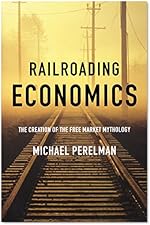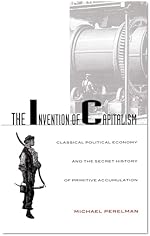Celebratory Eurocentrism
David Landes recently published an article explaining why the West prospered more than China. You can read the whole thing and scroll down. Landes finds the usual — that China lacked the proper market arrangements that makes capitalism work. But then he goes further, suggesting that the monasteries (hardly what one might think of as a free market) were a major factor in European success.
Landes, David S. 2006. “Why Europe and the West? Why Not China?” Journal of Economic Perspectives, 20: 2 (Spring): pp. 3-22.
3: As late as the end of the first millennium of our era, the civilizations of Asia were well ahead of Europe in wealth and knowledge. The Europe of what we call the Middle Ages (say, tenth century) had regressed from the power and pomp of Greece and Rome, had lost much of the science it had once possessed, had seen its economy retreat into generalized autarky. It traded little with other societies, for it had little surplus to sell, and insofar as it wanted goods from outside, it paid for them largely with human beings. Nothing testifies better to deep poverty than the export of slaves or the persistent exodus of job-hungry migrants.”
5: “The one civilization that was in a position to match and even anticipate the European achievement was China. China had two chances: first, to generate a continuing, self-sustaining process of scientific and technological advance on the basis of its indigenous traditions and achievements; and second, to learn from European science and technology once the foreign “barbarians” entered the Chinese domain in the sixteenth century. China failed both times.”
5: “The China specialists tell us, for example, that in a number of areas of industrial technique, China long anticipated Europe: in textiles, where the Chinese had a power-driven spinning machine in the thirteenth century, some 500 years before the England of the Industrial Revolution knew water frames and mules; or in iron manufacture, where the Chinese early learned to use coal and probably coke (as against charcoal) in blast furnaces for smelting iron and were turning out perhaps as many as 125,000 tons of pig iron by the later eleventh century-a figure not achieved by Britain until 700 years later (Elvin, 1973, p. 85). In general, one can establish a long list of instances of Chinese priority: the wheelbarrow, the stirrup, the rigid horse collar (to prevent choking), the compass, paper, printing, gunpowder, porcelain. (But not the horse-shoe, which implies that the Chinese did not make use of the horse for transport.)”
6: “But Chinese industrial history offers a number of examples of technological regression and oblivion. The machine to spin hemp was never adapted to the manufacture of cotton; cotton spinning was never mechanized; and coal/coke smelting was allowed to fall into disuse, along with the iron industry. Why, asks Elvin?” Elvin, Mark. 1973. The Pattern of the Chinese Past Stanford: Stanford University Press): pp. 297-298.
6: “Almost every element usually regarded by historians as a major contributory cause to the Industrial Revolution in north-western Europe was also present in China. There had even been a revolution in the relations between social classes, at least in the countryside; but this had had no important effect on the techniques of production. Only Galilean-Newtonian science was missing; but in the short run this was not important. Had the Chinese possessed, or developed, the seventeenth-century European mania for tinkering and improving, they could easily have made an efficient spinning machine out of the primitive model described by Wang Chen. A steam engine would have been more difficult; but it should not have posed insuperable difficulties to a people who had been building double-acting piston flame-throwers in the Sung dynasty. The crucial point is that nobody tried. In most fields, agriculture being the chief exception, Chinese technology stopped progressing well before the point at which a lack of scientific knowledge had become a serious obstacle.”
6: “Why indeed? Sinologists have put forward several partial explanations. Those that I find most persuasive are the following. First, China lacked a free market and institutionalized property rights. The Chinese state was always stepping in to interfere with private enterprise — to take over certain activities, to prohibit and inhibit others, to manipulate prices, to exact bribes.”
9: “The Europeans knew much less of these interferences. Instead, they entered during these centuries into an exciting world of innovation and emulation that challenged and tempted vested interests and kept the forces of conservatism scrambling. Changes were cumulative, news of novelty spread fast and a new sense of progress and achievement replaced an older, effete reverence for authority. This intoxicating sense of freedom touched (infected) all domains. These were years of heresies in the church, of popular initiatives that, we can see now, anticipated the rupture of the Reformation; of new forms of expression and collective action that challenged the older organization of society and posed a threat to other polities; of new ways of doing and making things that made newness a virtue and a source of delight.”
9: Important in all this was the role of the Christian church in Europe as custodian of knowledge and school for technicians. One might have expected otherwise: that organized spirituality, with its emphasis on prayer and contemplation, would have had little interest in technology; and that with its view of labor as penalty for original sin, it would have had no concern to save labor. And yet everything seems to have worked in the opposite direction: The desire to free clerics from time-consuming earthly tasks led to the introduction and diffusion of power machinery and, beginning with the Cistercians in the twelfth century, to the hiring of lay brothers (conversi) to do the dirty work, which led in turn to an awareness of and attention to time and productivity. All of this gave rise on monastic estates to remarkable assemblages of powered machinery-complex sequences designed to make the most of the water power available and distribute it through a series of industrial operations. A description of the abbey of Clairvaux in the mid-twelfth century (cited in White, 1978, p. 245-246) exults in this versatility: “coquendis, cribrandis, vertendis, terendis, rigandis, lavandis, molendis, molliendis, suum sine contradictione praestans obsequium.” The author, clearly proud of these achievements, further tells his readers that he will take the liberty of joking (the medieval clerical equivalent of, “if you’ll pardon the expression”): the fulling hammers, he says, seem to have dispensed the fullers of the penalty for their sins; and he thanks God that such devices can mitigate the oppressive labor of men and spare the backs of their horses.”

 25 – The Confiscation of American Prosperity: From Right-Wing Extremism and Economic Ideology to the Next Great Depression
25 – The Confiscation of American Prosperity: From Right-Wing Extremism and Economic Ideology to the Next Great Depression 30 – Manufacturing Discontent: The Trap of Individualism in Corporate Society
30 – Manufacturing Discontent: The Trap of Individualism in Corporate Society Class Warfare in the Information Age
Class Warfare in the Information Age Railroading Economics: The Creation of the Free Market Mythology
Railroading Economics: The Creation of the Free Market Mythology Steal This Idea: Intellectual Property Rights and the Corporate Confiscation of Creativity
Steal This Idea: Intellectual Property Rights and the Corporate Confiscation of Creativity The Invention of Capitalism: Classical Political Economy and the Secret History of Primitive Accumulation
The Invention of Capitalism: Classical Political Economy and the Secret History of Primitive Accumulation The Perverse Economy: The Impact of Markets on People and the Environment
The Perverse Economy: The Impact of Markets on People and the Environment
good
Crunk City Cobras.
Europe thanks to failure of Roman empire to unify the whole continent. Thus Europe had continuous competion and wars among its members. The competion promotes all creativity and innovation in all aspect of life. For the last 2 thousand years, there is hardly any peace in Europe.
China was like that during Warring State era, which was the time of great innovation and thought. Almost all Chinese philosophers like Congzi, Laozi, Sunzi art of war were produced during those time. Unified China had more time in peace, which is bad for innovation.
This eurocentrism explanation is deficient.
The problem with the explanation that tells you more about David Landes than about either China or Europe. Kenneth Pommeranz does a pretty good job in the great divergence at demolishing cultural explanation for China’s lack of industrialization.
As far as what I think is the reason. Look at the clothes you are wearing right now. They were not made in the factories of Europe but rather in the textile mills of China using massive amounts of cheap labor. One thing that China has done in the last few years is caused a massive deindustrialization in the world, as what used to be made with high capital industrial processes in the developed world, are now made with labor-intensive processes in China.
If the Chinese economy is causing a partial reversal of the industrial revolution *now*, then this suggests why the economic forces in China never caused an indigeneous industrial revolution in the 1800’s.
[…] https://michaelperelman.wordpress.com/2006/10/02/celebratory-eurocentrism/ […]
Hello
Great book. I just want to say what a fantastic thing you are doing! Good luck!
G’night
[…] Europe and the West? Why Not China?” Journal of Economic Perspectives, 20: 2 (Spring): pp. 3-22. Excerpts in this unsettling economics post). Landes notes that compared to Europe China through most of its history lacked secure property […]